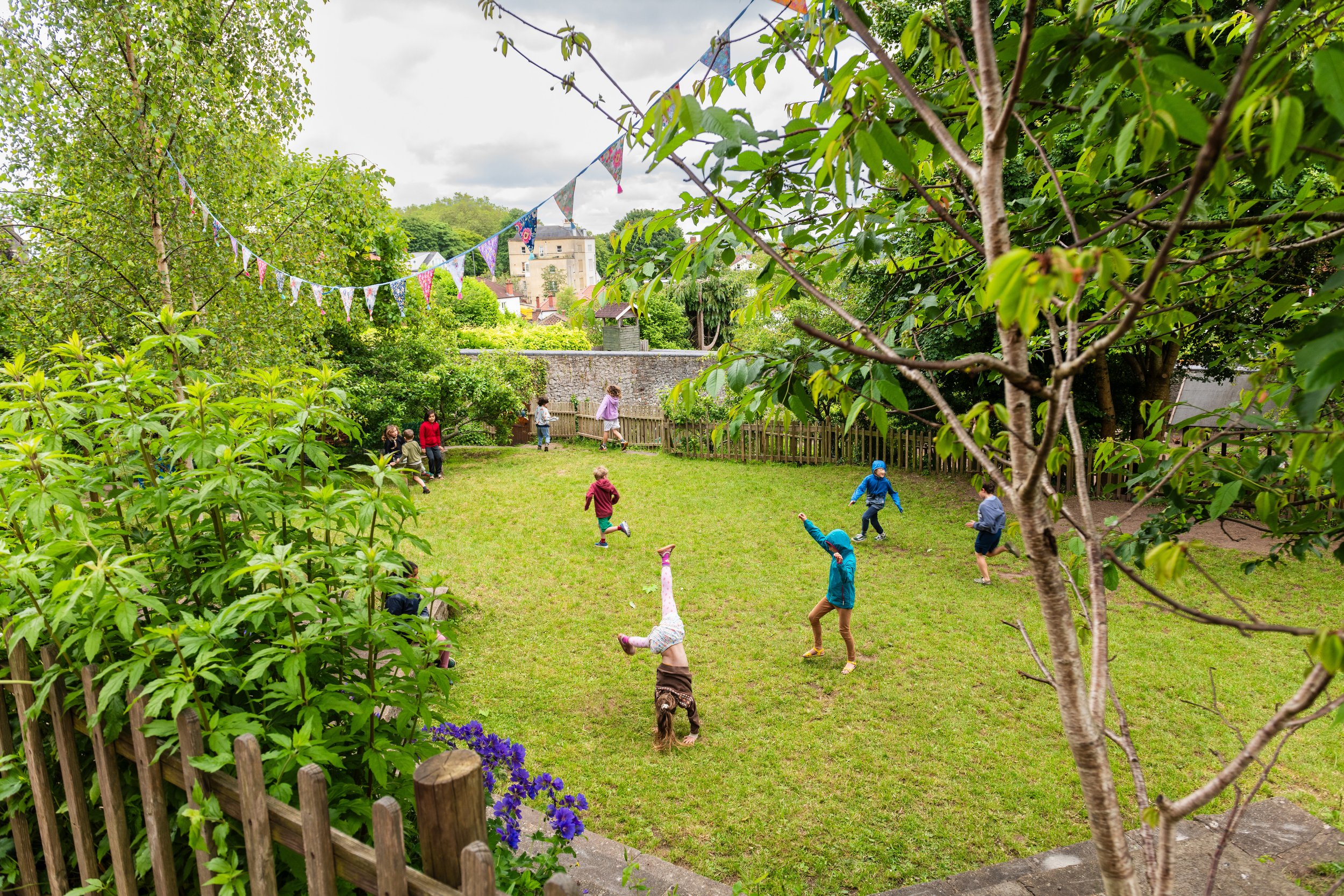Discover the Primary Years at Bristol Steiner School
Emotional Wellbeing
Our children-centred approach prioritises emotional wellbeing, ensuring each child's educational journey is encouraging and supportive. To reduce pressure and foster a love of learning, we focus on regular teacher feedback instead of formal tests.
Outdoor Learning
Our curriculum is rooted in outdoor learning, fostering a deep connection with nature. Our Forest School sessions allow children to explore, learn and grow in a natural setting while enhancing their physical and emotional health.
Practical Skills
Our curriculum emphasises practical skills through activities like woodwork, handwork and other hands-on projects. Children engage in drawing, painting, music, movement and drama, developing creativity and practical abilities.
Individual Approach
Our small class sizes promote close peer relationships and personalised learning experiences. Class Teachers develop a deep knowledge of each child's educational, social and emotional needs, allowing them to nurture their individual strengths.
Needs-based Behaviour Support
We steer clear of punishment and reward, instead taking a needs-based approach that supports children's emotional and social development. We focus on developing strong, trusting relationships between teachers and pupils.
Screen-Free Education
We proudly maintain a screen-free environment to support the development of imagination and nurture connection with teachers, fellow students and the natural world.

Foundation Years (Age 6-8)
Main Lesson
Each day at Bristol Steiner School begins with a two-hour Main Lesson led by the Class Teacher. The initial part of this lesson involves engaging activities like movement, music and poetry, as well as regular practice of mental arithmetic or spelling. The class then focuses on a specific topic, such as Mathematics, English or Nature Studies for three to four weeks. This immersive approach allows children to deeply engage with the subject matter and progress through various learning stages.
Time for Learning
After the focused period the subject is paused and a new topic is introduced. This rotation allows previous learning to be assimilated and revisited later, enhancing the children’s ability to apply their knowledge in new and meaningful ways.
Subject Lessons
In addition to the core curriculum delivered by the Class Teacher, a team of specialist teachers enriches the children's learning experience with subjects like Music, Modern Languages, Handwork, Form Drawing, Modelling, Eurythmy (an art form combining language, music, and movement) and Woodwork.
The school provides a huge part of our child’s scaffolding and we are so grateful that we have found a place where he can be happy and thrive.
Clare, Primary Years Parent
The Enrichment Years (Age 9-11)
Development of Learning
As children grow their relationship with the world around them evolves. Our curriculum reflects this development, encouraging independent learning and response to new challenges. New subjects such as Biology, Zoology, Geography, Geometry, and History are introduced gradually. Students create unique Main Lesson books for each subject, serving as a record of their achievements and a tool for parents and teachers to assess progress.
Main Lesson
Main Lessons for this age group include studies of ancient civilizations like Mesopotamia, Persia, Ancient India, Egypt and Greece. The rich mythologies of these cultures provide material for English Language work. Mathematics lessons now include decimals and geometry, building on earlier Form Drawing work. Additional topics cover Botany, focusing on plant evolution and local geography, expanding to encompass the British Isles. A highlight of this phase is the ‘Olympiad’, where students from various Waldorf Schools gather for a sports and gymnastics festival.
The Curriculum
A developing self-awareness is fostered through practical lessons. Mathematics includes measurement of weight, volume, time and money. Students study house building around the world and engage in practical projects. Formal grammar is introduced, encouraging a more objective understanding of language. Main Lessons also include introductions to Biology, allowing children to explore their individual interests and present their work to peers.

Subject Lessons and Enrichment Activities
At Bristol Steiner School, children engage in a diverse range of activities that support their holistic development, blending creativity with practical skills.
Handwork
Handwork lessons teach practical skills like knitting, crochet, spinning and sewing. These activities enhance cognitive, mathematical and creative abilities, encouraging precision and patience.
Woodwork
Our dedicated woodwork room, guided by a specialist carpenter, allows children to develop skills from whittling to carpentry. These activities foster fine motor skills and a deep appreciation for craftsmanship.
Forest School
Each year, for one term, children participate in weekly forest school activities on the Downs. This outdoor learning fosters a connection with nature and enhances physical and emotional well-being.
Spanish
Spanish is taught in an engaging way through songs and games, providing early exposure to a second language, enhancing cognitive flexibility and cultural awareness.
Music
From Class 1 children learn various instruments including the flute, guitar, and piano. Music lessons cultivate rhythm, coordination and a love for artistic expression.
Eurythmy
Eurythmy is a unique expressive movement art that combines speech, music, and movement. It helps children develop coordination, dexterity, balance and social skills by transforming music and speech into visible forms, fostering imagination and cognitive development.
Form Drawing
Form Drawing involves creating geometric patterns and shapes, which prepare children for writing and enhance their spatial awareness and fine motor skills. This practice supports cognitive development and artistic expression.
Painting
‘Wet-on-wet painting’ allows children to explore colours and forms fluidly. This method fosters creativity and emotional expression, providing a therapeutic and enjoyable artistic outlet.
These activities collectively nurture the fundamentals of mathematics and literacy through imaginative play, reducing pressure and stress while promoting a balanced and enriching educational experience.


































